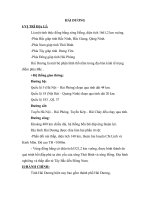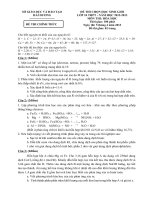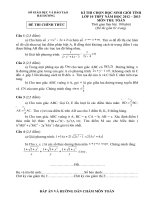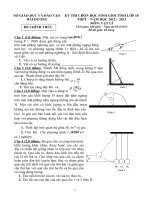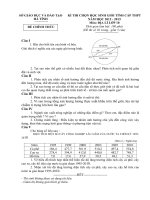ksl1 sở hải dương hdg
Bạn đang xem bản rút gọn của tài liệu. Xem và tải ngay bản đầy đủ của tài liệu tại đây (162.65 KB, 16 trang )
<span class="text_page_counter">Trang 1</span><div class="page_container" data-page="1">
attitude /ˈætɪtjuːd/ (n): quan điểmattraction /əˈtrækʃn/ (n): sự hấp dẫnhabitat /ˈhỉbɪtỉt/ (n): mơi trường sốngmanager /ˈmỉnɪdʒə(r)/ (n): quản lý
<i><b>Mark the letter A, B, C, or D on your answer sheet to indicate the word that differs from theother three in the position of stress in each of the following questions.</b></i>
Lời giảiChọn C
advent /ˈædvent/ (n): sự đến dựasthma /ˈæsmə/ (n): bệnh hendevice /dɪˈvaɪs/ (n): thiết bịdrama /ˈdrɑːmə/ (n): vở kịch
<b>Question 4: A. upmarketB. organicC. efficientD. talented</b>
Lời giảiChọn D
upmarket /ˌʌpˈmɑːkɪt/ (adj): xa xỉorganic /ɔːˈɡænɪk/ (adj): hữu cơefficient /ɪˈfɪʃnt/ (adj): có hiệu quảtalented /ˈtỉləntɪd/ (adj): có tài năng
<i><b>Mark the letter A, B, C, or D on your answer sheet to indicate the correct answer to each ofthe following questions.</b></i>
<b>Question 5: Mai travelled to Hoi An last summer, ______?</b>
Lời giảiChọn A
</div><span class="text_page_counter">Trang 2</span><div class="page_container" data-page="2">Câu hỏi đi ở thì q khứ đơn: S + Ved/V2…, didn’t + S?Tạm dịch: Mai đã đi Hội An vào mùa hè năm ngoái, phải không?
<b>Question 6: The schoolyard ______ by students every week.</b>
Lời giảiChọn B
<i>Cấu trúc câu bị động: S + am/is/are + VpII + (by O)</i>
Tạm dịch: Sân trường được học sinh dọn dẹp hàng tuần.
<b>Question 7: Minh agrees ______ Nam that there are more job opportunities in big cities.</b>
Lời giảiChọn C
agree with somebody/something: đồng ý với ai, đồng ý với điều gì
Tạm dịch: Minh đồng ý với Nam rằng có nhiều cơ hội việc làm hơn ở các thành phố lớn.
<b>Question 8: The more people use the Internet, ______ they connect with information.</b>
Lời giảiChọn D
<i>So sánh kép với tính từ ngắn “good”: The + adj + er + S + V, the + adj + er + S + V </i>
Tạm dịch: Càng nhiều người sử dụng Internet thì họ càng kết nối với thông tin tốt hơn.
<i><b>Question 9: The girl ______ kimono is my best friend.</b></i>
Lời giảiChọn A
Rút gọn mệnh đề quan hệ dạng chủ động, dùng Ving. Đại từ quan hệ ‘who’ và động từ ‘is’ đãđược lược bỏ.
<i>Tạm dịch: Cô gái mặc kimono là bạn thân nhất của tôi.</i>
<b>Question 10: I heard the thunder when I ______ my homework in my room.</b>
Lời giảiChọn B
When + S + was/were V-ing (quá khứ tiếp diễn), S + Ved/V2 (quá khứ đơn): diễn tả một hànhđộng đang diễn ra ở một thời điểm cụ thể, thì một hành động khác xảy đến.
Tạm dịch: Tôi nghe thấy tiếng sấm khi đang làm bài tập trong phòng.
<b>Question 11: By 2050, scientists predict that 70% of ______ world’s population will live in big</b>
cities.
</div><span class="text_page_counter">Trang 3</span><div class="page_container" data-page="3">Lời giảiChọn C
Dùng “The” khi nói về một vật hoặc một người mà cả người nghe và người nói đều biết.
Tạm dịch: Đến năm 2050, các nhà khoa học dự đoán 70% dân số thế giới sẽ sống ở các thànhphố lớn.
<b>Question 12: ______ much research, I used natural products for my healthy life.</b>
Lời giảiChọn D
Danh động từ hoàn thành là một danh động từ đề cập đến một hành động trong q khứ và đóng
<i>vai trị như một danh từ trong câu, có dạng: having + V3/having + been + V3</i>
Tạm dịch: Sau khi thực hiện nhiều nghiên cứu, tôi đã sử dụng các sản phẩm tự nhiên cho cuộcsống khỏe mạnh của mình.
<b>Question 13: Lily wants to buy a new smartphone ______ her old one stopped working.</b>
Lời giảiChọn A
because: bởi vì (diễn tả nguyên nhân - kết quả)
although + clause: mặc dù (diễn tả 2 mệnh đề tương phản)but: nhưng (diễn tả sự đối lập)
despite + N: mặc dù (diễn tả 2 mệnh đề tương phản)
Tạm dịch: Lily muốn mua một chiếc điện thoại thông minh mới vì chiếc điện thoại cũ của cơ ấyđã bị hỏng.
<b>Question 14: Chung Cake is a ______ Vietnamese dish during Tet holidays.</b>
<b>A. traditionB. traditionalC. traditionallyD. traditionalist</b>
Lời giảiChọn B
tradition (n): truyền thống
traditional (adj): theo truyền thống
traditionally (adv): một cách truyền thống
traditionalist (n): người theo chủ nghĩa truyền thống
Trong câu cần một tính từ để bổ nghĩa cho cụm danh từ “Vietnamese dish”.
<i>Tạm dịch: Bánh Chưng là món ăn truyền thống của người Việt trong dịp Tết.</i>
<b>Question 15: I will ______ the supermarket on my way home to buy food for dinner.</b>
Lời giảiChọn C
bring up (phr.v): nuôi dưỡng
</div><span class="text_page_counter">Trang 4</span><div class="page_container" data-page="4">take over (phr.v): đảm nhậndrop by (phr.v): ghé quacome out (phr.v): xuất bản
Tạm dịch: Tôi sẽ ghé qua siêu thị trên đường về nhà để mua đồ ăn cho bữa tối.
<b>Question 16: Urbanization has created numerous ______ choices for people as cities grow and</b>
Lời giảiChọn D
task (n): nhiệm vụtrade (n): ngành nghềchore (n): việc nhà
career (n): nghề nghiệp → phù hợp với ngữ cảnh
Tạm dịch: Đơ thị hóa đã tạo ra nhiều lựa chọn nghề nghiệp cho người dân khi các thành phố tăngtrưởng và phát triển.
<b>Question 17: Saving electricity is one way to conserve natural ______ as it is generated by</b>
burning coal.
Lời giảiChọn A
resource (n): tài nguyênproduct (n): sản phẩmhabitat (n): môi trường sốngissue (n): vấn đề
Tạm dịch: Tiết kiệm điện là một cách để bảo tồn tài nguyên thiên nhiên vì nó được tạo ra bằngviệc đốt than.
<b>Question 18: To get a good mark on the upcoming history test, I need to ______ all the dates</b>
and events.
Lời giảiChọn B
rack one’s brain: nghĩ nát óc
learn by heart: học thuộc lòng → phù hợp với ngữ cảnhsink or swim: được ăn cả ngã về khơng
beat the clock: hồn thành trước hạn
Tạm dịch: Để đạt điểm cao trong bài kiểm tra lịch sử sắp tới, tơi cần phải học thuộc lịng tất cảcác ngày tháng và sự kiện.
</div><span class="text_page_counter">Trang 5</span><div class="page_container" data-page="5"><b>Question 19: Even though many generations have passed, Vietnamese culture has always been</b>
______ alive.
Lời giảiChọn C
keep alive: gìn giữ
Tạm dịch: Dù đã trải qua nhiều thế hệ nhưng nền văn hóa Việt Nam vẫn ln được gìn giữ.
<i><b>Mark the letter A, B, C, or D on your answer sheet to indicate the word(s) CLOSEST inmeaning to the underlined word in each of the following questions.</b></i>
<b>Question 20: He is such a gifted child that he enrolled in university at the age of 12.</b>
Lời giảiChọn B
gifted (adj) = talented (adj): có tàiaverage (adj): trung bình
common (adj): tầm thườngdisabled (adj): tàn tật
Tạm dịch: Anh ấy là một đứa trẻ có năng khiếu đến nỗi anh ấy đã đăng ký vào đại học năm 12tuổi.
<b>Question 21: This conference aims to promote eco-friendly behaviors within our community.</b>
Lời giảiChọn C
promote (v) = encourage (v): khuyến khíchadopt (v): nhận ni, chấp nhận, thơng quaprevent (v): ngăn cản
unite (v): đoàn kết >< divide (v): chia cắtcombine (v): kết hợp
</div><span class="text_page_counter">Trang 6</span><div class="page_container" data-page="6">gather (v): tập hợp, thu thậpmaintain (v): duy trì
Tạm dịch: Niềm đam mê chung đối với mơi trường đã giúp họ đồn kết mặc dù có xuất thân đadạng.
<b>Question 23: The twins were like chalk and cheese; one had a passion for art, while the other</b>
excelled in mathematics.
Lời giảiChọn A
like chalk and cheese (idiom): rất khác nhau >< identical (adj): giống nhaudifferent (adj): khác nhau
diverse (adj): đa dạng
<b>Question 24: Jane and Tom are in the library.</b>
- Jane: “Would you mind if I borrowed your laptop?” - Tom: “______.”
Lời giảiChọn B
Yes, it’s a nice day: Đúng, thật là một ngày đẹp trời No, not at all: Không, không hề
No, thanks: Không, cảm ơn
I’m glad you like it: Thật vui vì bạn thích nóTạm dịch: Jane và Tom đang ở trong thư viện.
- Jane: “Bạn có phiền nếu mình mượn máy tính của bạn khơng?”- Tom: “Khơng, không hề.”
<b>Question 25: Jordan gives Kate chocolate on her birthday.- Kate: “It is very kind of you to bring me chocolate.” </b>
- Jordan: “______”
Lời giảiChọn D
</div><span class="text_page_counter">Trang 7</span><div class="page_container" data-page="7">What would you like?: Bạn thích gì?What’s the matter?: Có vấn đề gì vậy?I didn’t say that: Tơi khơng nói vậy.
Don’t mention it: Không cần khách sáo đâu.
Tạm dịch: Jordan tặng Kate sô cô la vào ngày sinh nhật của cô ấy.- Kate: “Bạn thật tử tế khi tặng mình sơ cô la.”
- Jordan: “Không cần khách sáo đâu.”
<i><b>Read the following passage and mark the letter A, B, C or D on your answer sheet to indicatethe correct word or phrase that best fits each of the numbered blanks.</b></i>
Zhang Guimei, 63, is the founder and principal of Huaping High School for Girls inHuaping county of Lijiang, Yunnan Province. She is legendary not only because she started such
<b>a free school for girls who dropped out for economic reasons, but also her huge (26) ______ for</b>
decades to persuade girls to study hard and change their destinies.
<b>(27) ______ its disadvantaged location and resources, Zhang's school ranked top on the rate of</b>
graduates entering universities in Lijiang. Since 2008, nearly 2,000 girls from Zhang's school
<b>have entered universities and change their lives via education. Zhang dedicated her youth, health</b>
and enthusiasm to the great cause of education.
<b>When she worked as the chief of a care center for homeless children, she noticed that (28)</b>
______ poor families sent their sons to school but not their daughters. Start-up money for the
<b>school was raised by Zhang, (29) ______ asked for donations on the streets from 2002-07. Thesituation became better when her story was (30) ______ by a reporter in 2007 and donations</b>
from across the nation arrived.
Zhang was recognized as one of the "10 people who moved China in 2020." She was also arecipient of China's July 1 medal.
<i><small>(Adapted from 26: A. disappointment B. allowanceC. commitmentD. interruption</b>
Lời giảiChọn C
disappointment (n): sự thất vọngallowance (n): tiền trợ cấpcommitment (n): sự tận tụyinterruption (n): sự gián đoạn
Trích bài: She is legendary not only because she started such a free school for girls who dropped
<b>out for economic reasons, but also her huge commitment for decades to persuade girls to study</b>
hard and change their destinies.
Tạm dịch: Bà ấy trở thành huyền thoại khơng chỉ vì đã thành lập một trường học miễn phí dànhcho những bé gái bỏ học vì lý do kinh tế, mà cịn vì sự tận tụy lớn lao trong nhiều thập kỷ đểthuyết phục các bé gái học tập chăm chỉ và thay đổi số phận của họ.
</div><span class="text_page_counter">Trang 8</span><div class="page_container" data-page="8">Lời giảiChọn A
Despite + N/Ving: mặc dù (thể hiện sự tương phản giữa hai ý trong cùng một câu)
Although + clause: mặc dù (liên kết, diễn đạt những nội dung có sự tương phản hoặc đối lập vềngữ nghĩa hoặc logic)
Moreover: thêm vào đó (bổ sung thơng tin nhằm mục đích làm rõ hoặc nhấn mạnh)
Since: kể từ khi (mang ý nghĩa thời gian)/bởi vì (diễn đạt mối quan hệ nguyên nhân - kết quả)
<b>Trích bài: Despite its disadvantaged location and resources, Zhang's school ranked top on the</b>
rate of graduates entering universities in Lijiang.
Tạm dịch: Mặc dù có vị trí và nguồn lực khó khăn, trường của Zhang vẫn đứng đầu về tỷ lệ sinhviên tốt nghiệp vào các trường đại học ở Lệ Giang.
Lời giảiChọn C
much: nhiều (đi với danh từ không đếm được)
a little: một ít, đủ để dùng (đi với danh từ không đếm được) many: nhiều (đi với danh từ đếm được)
any: một vài, một chút, sử dụng trong câu phủ định (đi với danh từ đếm được và không đếmđược)
Câu đã cho là câu khẳng định. Danh từ sau chỗ trống là ‘families’ (danh từ ở dạng số nhiều, đếmđược).
Trích bài: When she worked as the chief of a care center for homeless children, she noticed that
<b>many poor families sent their sons to school but not their daughters. </b>
Tạm dịch: Khi còn làm giám đốc một trung tâm chăm sóc trẻ em vơ gia cư, cơ nhận thấy nhiềugia đình nghèo cho con trai đến trường nhưng con gái thì khơng.
Lời giảiChọn D
where: trạng từ quan hệ chỉ địa điểm
that: đại từ quan hệ chỉ người hoặc vật, sử dụng trong mệnh đề quan hệ xác định (khơng có dấuphẩy)
which: đại từ quan hệ chỉ vậtwho: đại từ quan hệ chỉ người
Sử dụng đại từ quan hệ which để thay thế cho cụm danh từ ‘a balanced diet’ phía trước.
<b>Trích bài: Start-up money for the school was raised by Zhang, who asked for donations on the</b>
</div><span class="text_page_counter">Trang 9</span><div class="page_container" data-page="9">Lời giảiChọn A
publish (v): xuất bảndesign (v): thiết kếhide (v): giấu diếmrefuse (v): từ chối
<b>Trích bài: The situation became better when her story was published by a reporter in 2007 and</b>
donations from across the nation arrived.
Tạm dịch: Tình hình trở nên tốt hơn khi câu chuyện của cô được một phóng viên đăng tải vàonăm 2007 và số tiền quyên góp từ khắp cả nước đã đổ về.
<i><b>Read the following passage and mark the letter A, B, C, or D on your answer sheet to indicatethe correct answer to each of the following questions.</b></i>
If you are moving to a new country, you may be worried about adjusting to your new communityand losing your family traditions. However, it's crucial to understand that embracing a newculture doesn't require abandoning one's traditions. Balancing both cultures will be essential tomaintaining your identity while embracing a new culture. Living in a new country can feelstrange and confusing, so what do you do to keep your roots and preserve your heritage?
<b>Keep Constant Communication with Family & Friends</b>
It is vital to keep in touch with friends and family members to stay connected to your old homeand heritage. Whether it’s to call your mom for your favourite family recipe or your friends to
<b>recall memories, keeping in touch with your friends and family can help you preserve your</b>
<b>Join Local Clubs & Associations Tied to Your Culture</b>
Another great way to preserve your heritage in a new country is by joining associations or clubsthat connect with your lifestyle and community. These gatherings provide a space to practice andcelebrate cultural customs while fostering connections with others who have experienced similartransitions.
<b>Maintain Cultural Tradition by Sharing It with Others</b>
<b>A perfect way to preserve your traditions is to continue practicing them in your new home,</b>
whether they are daily habits, celebrations, or food. There is nothing better than sharing thetraditions you love with friends or colleagues in your new home. You can do this by bringinghomemade treats to your office or hosting traditional events with new friends.
<i><small>(Adapted from 31: What is the passage mainly about?A. Coping with cultural changes after relocatingB. Balancing traditions in a new environmentC. Holding onto traditions in a different cultureD. Making friends while adjusting to a new place</b>
Lời giải
</div><span class="text_page_counter">Trang 10</span><div class="page_container" data-page="10">Chọn C
Thông tin: If you are moving to a new country, you may be worried about adjusting to your newcommunity and losing your family traditions … Balancing both cultures will be essential tomaintaining your identity while embracing a new culture.
Tạm dịch: Nếu bạn sắp chuyển đến một đất nước mới, bạn có thể lo lắng về việc thích nghi vớicộng đồng mới và mất đi truyền thống gia đình … Cân bằng cả hai nền văn hóa sẽ là điều cầnthiết để duy trì bản sắc của bạn trong khi tiếp nhận một nền văn hóa mới.
<b>Question 32: The word “recall” in paragraph 2 is closest in meaning to ______.</b>
Lời giải Chọn B
recall (v) = remember (v): nhớ lại forget (v): quên
imagine (v): tưởng tượngreflect (v): phản ánh, suy nghĩ
<b>Question 33: The word “them” in paragraph 4 refers to ______.</b>
<b>A. transitionsB. homemade treatsC. traditionsD. friends</b>
Lời giải Chọn C
<b>Thông tin: A perfect way to preserve your traditions is to continue practicing them in your new</b>
home, whether they are daily habits, celebrations, or food.
Tạm dịch: Một cách hoàn hảo để bảo tồn truyền thống của bạn là tiếp tục thực hành chúng trongngôi nhà mới của bạn, cho dù đó là thói quen hàng ngày, lễ kỷ niệm hay đồ ăn.
<b>Question 34: To continue cultural traditions in a new country, you can ______.A. discontinue familiar customs altogether</b>
<b>B. share traditions only with family membersC. maintain cultural practices in the new homeD. conceal cultural practices from others</b>
Lời giải Chọn C
Thông tin: A perfect way to preserve your traditions is to continue practicing them in your newhome, whether they are daily habits, celebrations, or food.
Tạm dịch: Một cách hoàn hảo để bảo tồn truyền thống của bạn là tiếp tục thực hành chúng trongngôi nhà mới của bạn, cho dù đó là thói quen hàng ngày, lễ kỷ niệm hay đồ ăn.
<b>Question 35: What is NOT mentioned as a way to maintain your cultural identity?A. Calling your familyB. Taking part in a sport clubC. Sharing your cultural dishesD. Hosting traditional events</b>
Lời giải Chọn B
</div>